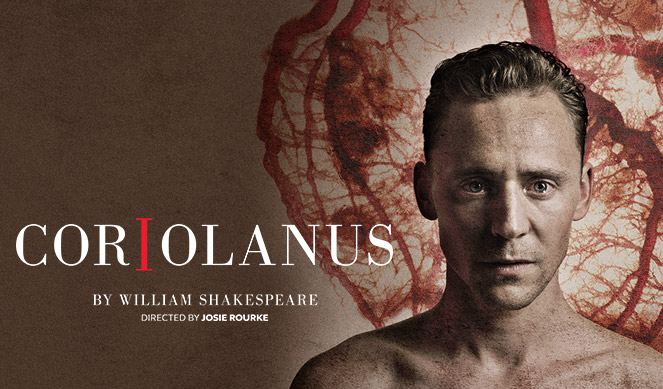
January 31, 2014, by Peter Kirwan
Coriolanus (Donmar/NT Live) @ The Broadway, Nottingham
The Hiddleston effect is a very tangible thing. As the stalwart Emma Freud reminded international audiences in what was, frankly, the most banal interval interview NT Live has yet managed (which is saying something), Tom Hiddleston was recently voted Sexiest Man Alive by MTV, and his Coriolanus attracted the youngest audience I’ve yet seen to an NT Live Shakespeare screening in Nottingham. Of far more interest was Josie Rourke’s observation that to cast Coriolanus so young is to invite a very different kind of interpretation; no longer the tried and tested soldier, but the charismatic leader of men. Like its star, this was a Coriolanus that aimed to woo and buoy up its audience, but refused to condescend.
As with the previous evening’s A Midsummer Night’s Dream, many of my students are writing on this production for an assessment, and as I’m reviewing this production for Shakespeare Bulletin I won’t risk (mis)leading my students with a long review here. But I do feel the need to get four thoughts out there:
- Key to this production was a sophisticated politicking between Tom Hiddleston’s diffident Caius Martius and the quite wonderful Brutus and Sicinia of Elliot Levey and Helen Schlesinger. I cannot praise Levey’s performance enough, with its mixture of snide disdain, Blair-like faux empathy with the people, and a laughing refusal to accept the inevitable calamity. Schlesinger, meanwhile, excelled in her wrangling of Martius’ banishment, whipping herself into an ecstatic frenzy as she called for his banishment. That the two tribunes had kissed passionately just prior to this scene created a wonderful frisson of shared sexual energy as the politicians masterminded their success. Hiddleston, meanwhile, showed his mettle in a fine range of simpering, sarcastic and self-mocking expressions when exposing himself to the people, and drew on an impressive stillness to convey his rage at the tribunes, only eventually erupting into ‘I banish you.’
- On the cramped stage of the Donmar, some innovative staging arrangements maximised the potential of the space. Notably, Corioles was positioned vertically above the main stage, allowing Martius to ascend a ladder into it when invading the space. As a stripped down depiction of war with a small cast and a bare stage, Rourke’s conceptualisation of the battles did a great deal with very little.
- The play came into its own in the second half. Hadley Fraser’s Mancunian Aufidius was mesmerising as he welcomed Martius to Antium, switching from an extraordinarily tense moment as a lackey held a knife to Martius’s spine to a kiss delivered in unbridled enthusiasm at his rival’s appearance. The final moment built on this, cutting the final Rome scene to resituate the murder as a direct and immediate response to Martius’ capitulation. Most importantly, Martius wasn’t killed until after Aufidius’ turn to grief. In the play this is of course a regretful response to the murder; here, his regret was expressed even before he gave the order to have Coriolanus strung up and gutted.
- Mark Gatiss almost made me cry as Menenius. While he played exactly the same role he always does, here he was perfect, and the destruction of his confidence as Martius denied him – played in the subtlest of facial dips – was heartbreaking.
Finally, the reaction in my cinema to the sight of Hiddleston taking off his shirt and washing off the blood of Corioles under a jet from above was raw, to say the least.
I’m looking forward to exploring this production at greater length, as there’s so much to say about a production that revived a rarely performed play with absolute clarity and a good deal of wit. That it clearly worked for so many people on so many levels – including those that were only skin-deep – is all to the good.

[…] with the view; but more generally, there was none of the dynamism that characterised the filming of Coriolanus, Macbeth or Frankenstein. Not since Phedre have I felt so frustrated by the limitations of the […]